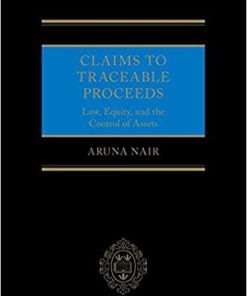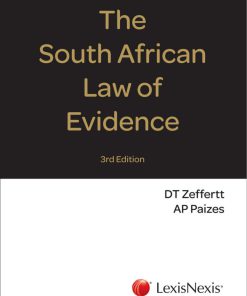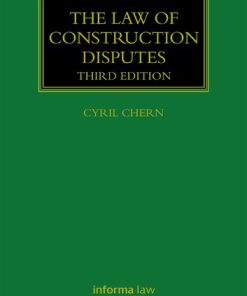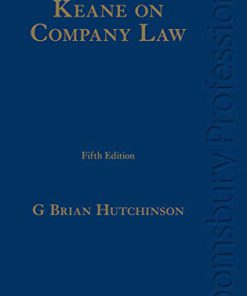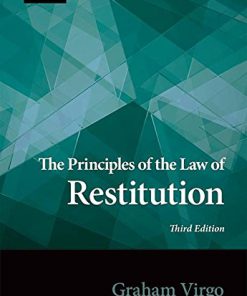Equity and the Law of Trusts in Ireland 3rd Edition by Ronan Keane ISBN 1526502534 9781526502537
$50.00 Original price was: $50.00.$25.00Current price is: $25.00.
Equity and the Law of Trusts in Ireland 3rd Edition by Ronan Keane – Ebook PDF Instant Download/Delivery: 1526502534, 9781526502537
Full download Equity and the Law of Trusts in Ireland 3rd Edition after payment
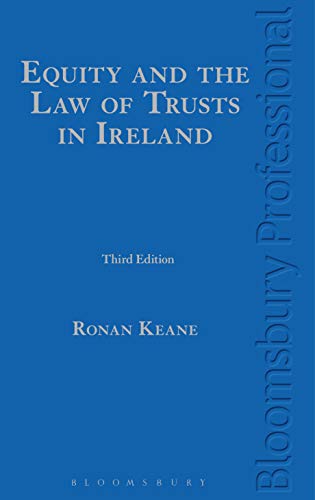
Product details:
ISBN 10: 1526502534
ISBN 13: 9781526502537
Author: Ronan Keane
The third edition of this well-established legal text provides a comprehensive treatment and analysis of the area of equity and trusts. Set out in a user-friendly fashion that is easy to navigate, the book traces the development through history of the law of equity, the law of trusts, and equitable remedies. This updated and expanded new edition provides an insight into recent developments in relation to both trusts and equitable remedies. New important case law in the area such as Stanley v Kieran [2012] IESC 19, Greene v Coady [2014] IEHC 38 and Ulster Bank v Roche [2012] 1 IR 765 are fully explored. There are essential updates in the areas of wills and probate, including a look at constructive trusts and Cawley & Anor v Lillis [2011] IECH 515, as well as updates in relation to proprietary estoppel claims and the three recent High Court decisions in this area. Of particular interest to both academics and practitioners is the section on injunctions due to the many areas of law involved, including asylum, commercial and industrial relations. While the audience for this title will be largely academic, in particular law students, there is also a wealth of information which practitioners will find beneficial. This title is included in Bloomsbury Professional’s Irish Property Law and Irish Wills and Probate online service.
Equity and the Law of Trusts in Ireland 3rd Table of contents:
Chapter 1: Introduction
Introduction
Chapter 2: The Historical Background
Introduction
The Historical Background
The Development of the Modern Law of Equity
The nineteenth century: decay and reform
Modern developments: the fusion controversy
Chapter 3: The Maxims of Equity
Introduction
Equity Follows the Law
Equity Will Not Suffer a Wrong to be Without a Remedy
Equity Acts In Personam
He who seeks Equity must do Equity
He who comes into Equity must come with Clean Hands
Delay Defeats Equity
Equality is Equity
Equity Looks to the Intent Rather than the Form
Equity Looks on That as Done Which Ought to have been Done
Equity Imputes an Intention to Fulfil an Obligation
Where the Equities are Equal, The First in Time Prevails: Where the Equities are Equal, The Law Prev
Chapter 4: Equitable Interests and ‘Equities’
Introduction
What is meant by an ‘Equity’?
Equitable Interests
Chapter 5: Priorities, Registration and Notice
Registration in Ireland
Where the equities are equal, the first in time prevails
Where the equities are equal, the law prevails
Overreaching
Notice Generally
Registered Land
Judgment Mortgages
Chapter 6: The Nature of a Trust
Introduction
What is a Trust?
Chapter 7: Express Trusts I: The Essential Elements
Introduction
Words Relied on as Creating a Trust must be Imperative
The Subject Matter must be Certain
The Objects must be Certain
Purpose Trusts
(a) The trust cannot be enforced by the court
(b) The trust will violate the rule against perpetuities and against inalienability
Chapter 8: Express Trusts II: The Formal Requirements
Cases where Formal Requirements must be Met
Secret and Half-Secret Trusts
Completely and Incompletely Constituted Trusts
(a) Where the settlor subsequently vests the legal title in the trustee or beneficiary, the trust is
(b) Donationes Mortis Causa
(c) Proprietary estoppel
Chapter 9: The Office of Trustee
Introduction
Those who can be Appointed Trustees
Personal Representatives and Trustees
Number of trustees
No provision for public trustee, judicial trustee or custodial trustee
Appointment of Trustees
Appointment of new or additional trustees by the court
Retirement of Trustees
Removal of Trustees
Chapter 10: Duties and Powers of Trustees
Trustee’s Duty to Collect or Get in and Safeguard the Trust Property
Investment by the Trustee Generally
Authorised Investments
‘Ordinary Prudence’ in Investing
Mortgages
Trustee’s Duty to Convert the Trust Property: the Rule in Howe v The Earl of Dartmouth
(a) No apportionment need be made by the trustee in the case of a sale ‘ex-dividend’ or ‘cum-d
(b) Arrears of dividend on cumulative preference shares belong to the person entitled to the income
(c) Where a company distributes as dividend a reserve fund, the dividend belongs to the tenant for l
(d) Where the company distributes accumulated profits in the form of an issue of bonus shares, it is
(e) Where the debts of a testator are not paid immediately out of his estate, an appropriate reducti
(f) The trustees are required to apportion the cost of repairs and maintenance between capital and i
Trustee’s Duty to Distribute the Trust Estate
Trustee’s Duty to Keep Accounts and Provide Information
Sales by Trustees
Compromises, etc
Maintenance of Minors
Exercise by Trustees of Discretionary Powers
Fiduciary Restraints on Trustees
(a) A trustee is not entitled to any remuneration for his work as a trustee
(b) A trustee is not allowed to deal in or purchase the trust property
(c) A trustee may not delegate his office
Liability of Trustee for Default of his Agent
Liability of Trustee for Breach of Trust
Variation of Trusts
(a) Where the trustees of settled property are allowed to enter into a business transaction not auth
(b) Where maintenance is permitted out of income directed to be accumulated
(c) Where the court directs changes in the nature of a minor’s property
(d) Where the trustees are allowed to enter into a compromise on behalf of infants and unborn benefi
Variations under the Land and Conveyancing Law Reform Act 2009
Chapter 11: Charitable Trusts
Introduction
The Four Classes of Charitable Trusts
The Legal Definition of Charity
Gifts for Mixed Charitable and Non-Charitable Purposes
Trusts for the Relief of Poverty
Trusts for the Advancement of Education
Trusts for the Advancement of Religion
The Fourth Class
(a) The old and the disabled
(b) Health
(c) Recreation
(d) Animals
(e) Political objects
(f) Additional categories under the 2009 Act
The Cy-près Jurisdiction
The Sign Manual Procedure
The Charities Regulatory Authority
Chapter 12: Resulting Trusts
Nature of Resulting Trusts
(a) Resulting trusts arising where the beneficial interest has not been disposed of
(b) Resulting trusts arising from voluntary dispositions
(c) Resulting trusts arising where the purchase money has been provided in whole or in part by a thi
The Presumption of Advancement
Resulting Trusts in Family Law Cases
Resulting Trust or Constructive Trust?
Chapter 13: Constructive Trusts
The Nature of Constructive Trusts
Benefits Obtained by Trustees and Other Fiduciaries
Constructive Trusts where there is no Fiduciary Relationship
(a) Assisting a breach of trust
(b) Knowingly receiving trust property in breach of trust
(c) Trustee de son tort
(d) Vendor under a contract for sale
(e) Mortgagees
(f) Mutual wills
(g) Secret trusts
(h) Where a person acquires property by killing another
(i) Pallant v Morgan trusts
‘New Model’ Constructive Trusts
Remedial Constructive Trusts
Chapter 14: Void and Voidable Trusts
Introduction
Trusts Subject to Unenforceable Conditions
Voidable Trusts
Settlements made with intent to defraud creditors
Settlements rendered voidable by the subsequent bankruptcy of the settlor
Chapter 15: The Injunction
Introduction
The Development of the Injunction
Principles on which the Court Acts in Granting Injunctions
(a) The injunction must be granted to protect a legal right of the plaintiff
(b) The legal right must have been infringed or there must at least be a probability that it will be
(c) The injunction will only be granted where there is no other adequate remedy
Injunctions in Specific Cases
(a) Nuisance
(b) Trespass
(c) Picketing of premises
(d) Industrial, commercial and intellectual property
(e) Passing off
(f) Defamation
(g) Breaches of contract
(h) Wrongful removal from office
Constitutional Rights
Public and Statutory Rights
Interlocutory Injunctions: The General Law
Interlocutory Injunctions: the ‘Balance of Convenience’
Interlocutory Injunctions: ‘Special Factors’
(a) Cases where if the injunction is granted a full trial of the action is unlikely
(b) Cases of defamation
(c) Contracts of personal service
(d) Public law and European Union law cases
(e) Cases arising out of trade disputes
(e) Petitions for the winding up of a company
Procedures in Application for Interlocutory Injunction
Interim Injunctions
Interim and Interlocutory Injunctions against the State
Mandatory Injunctions
Quia Timet Injunctions
Damages in Lieu of an Injunction
The Mareva Injunction
The Anton Piller Order
The Bayer Order
Injunctions in Judicial Review Cases
Enforcement of Injunctions
Chapter 16: Specific Performance
Introduction
Specific Performance of Different Types of Contract
Defences to Actions for Specific Performance
Part Performance
Rights of the Plaintiff where there has been a Breach after Proceedings have Commenced
Damages in Addition to or in Substitution for Specific Performance
Choosing between Specific Performance and Damages
Chapter 17: Rescission
Introduction
The Equitable Remedy of Rescission
Fraudulent and Innocent Misrepresentation
Contracts Uberrimae Fidei
(a) Contracts of insurance
(b) Contracts to take shares in a company
(c) Family arrangements
Mistake
(a) Common mistake
(b) Mutual mistake
(c) Unilateral mistake
(d) Voluntary transactions
Laches, Acquiescence and Affirmation as Bars to Rescission
Chapter 18: Rectification
Introduction
Rectification in Cases of Common Mistake
Rectification in Cases of Unilateral Mistake
No Rectification where Parties Mistaken as to Meaning of Contract
Onus of Proof in Case of Rectification
Rectification not Always the Appropriate Remedy
Voluntary Settlements and Wills
Chapter 19: Tracing in Equity
Tracing Property at Common Law and in Equity
When the Tracing Remedy is Available
The Position of Volunteers and Purchasers for Value
Adjustments between Competing Claims to Property
Tracing Remedy not Confined to Money and Land
Chapter 20: Delivery Up and Cancellation of Documents
Delivery Up and Cancellation
Chapter 21: Receivers
Introduction
Circumstances in which a Receiver is appointed by the Court
Nature of the Office of Receiver appointed by the Court
Remuneration and Security
Receiver by Way of Equitable Execution
Chapter 22: Conversion and Reconversion
Introduction
Conversion under a Direction in a Will or Other Instrument
Conversion under a Contract for the Sale of Land
Conversion under an Option to Purchase
Conversion and the Registration of Title System
Conversion under an Order of the Court
Partnership Property
Conversion when there is a Partial Failure of Objects
Reconversion
Chapter 23: Election
Introduction
The Essentials of Election
Gift under Will must be Available for Compensation
True Owner’s Property must be Capable of Alienation
What Constitutes Election
Derivative Interests
Election and the Rule against Perpetuities
Chapter 24: Account
Introduction
Cases where an Account will be Ordered
Chapter 25: Satisfaction and Ademption
Introduction
Satisfaction of Debts by Legacies
Satisfaction of ‘Portion Debts’ by Legacies
Ademption of Legacies by Portions or Portion Debts
Benefits to strangers arising from presumption against double portions
Ademption of Legacies by Subsequent Gifts
Satisfaction of Legacies by Legacies
Satisfaction of Portion and Other Debts by Subsequent Inter Vivos Payments
Evidence Rebutting Presumption of Satisfaction and Ademption
Chapter 26: Performance
Doctrine of Performance
Chapter 27: Estoppel in Equity
The Genesis of Equitable Estoppel
Promissory Estoppel
Proprietary Estoppel
Proprietary Estoppel and Constructive Trusts
Chapter 28: Constructive Fraud: Undue Influence and Unconscionable Transactions
Introduction
Undue Influence in General
The Presumption of Undue Influence
(a) Parent and child
(b) Guardian and ward
(c) Solicitor and client
(d) Spiritual advisers
(e) Medical advisers
(f) Other relationships of trust
Rebutting the Presumption of Undue Influence
Liabilities of Third Parties in Cases of Undue Influence: Wives and Other Cohabitees Acting as Suret
Undue influence where no presumption arises
Unconscionable Transactions
Chapter 29: Breach of Confidence and Privacy
Introduction
The Origin and Nature of the Doctrine
The Requirement of Secrecy
Privacy
The Defence of ‘Public Interest’ or ‘Iniquity’
Non-Commercial Information
Government and Public Bodies Confidences
Remedies
Chapter 30: Administration of Estates: Generally
Introduction
The Personal Representative
Order of Application of Assets
Chapter 31: Administration of Estates: Remedies
Introduction
Administration by the Court
Actions against the Personal Representative
Liability of Recipients of Assets
People also search for Equity and the Law of Trusts in Ireland 3rd:
equity and the law of trusts in ireland
keane equity and the law of trusts in ireland
hilary biehler equity and the law of trusts in ireland
biehler equity and the law of trusts in ireland pdf
equity and the law of trusts in ireland biehler
Tags:
Ronan Keane,Equity,Law,Trusts,Ireland
You may also like…
Jurisprudence & Law - Medical Law
Uncategorized
Commercial & Financial Law
Claims to Traceable Proceeds: Law, Equity, and the Control of Assets Aruna Nair
Jurisprudence & Law - General & Miscellaneous Law
Privacy Law in Ireland 1st Edition Róisín Á Costello 9781526524553, 1526524554
Jurisprudence & Law - General & Miscellaneous Law
Commercial & Financial Law
Commercial & Financial Law
Keane on Company Law A Guide to Irish Law Fifth Edition Hutchinson
Jurisprudence & Law
The International Law of the Sea 3rd Edition Yoshifumi Tanaka
Jurisprudence & Law






